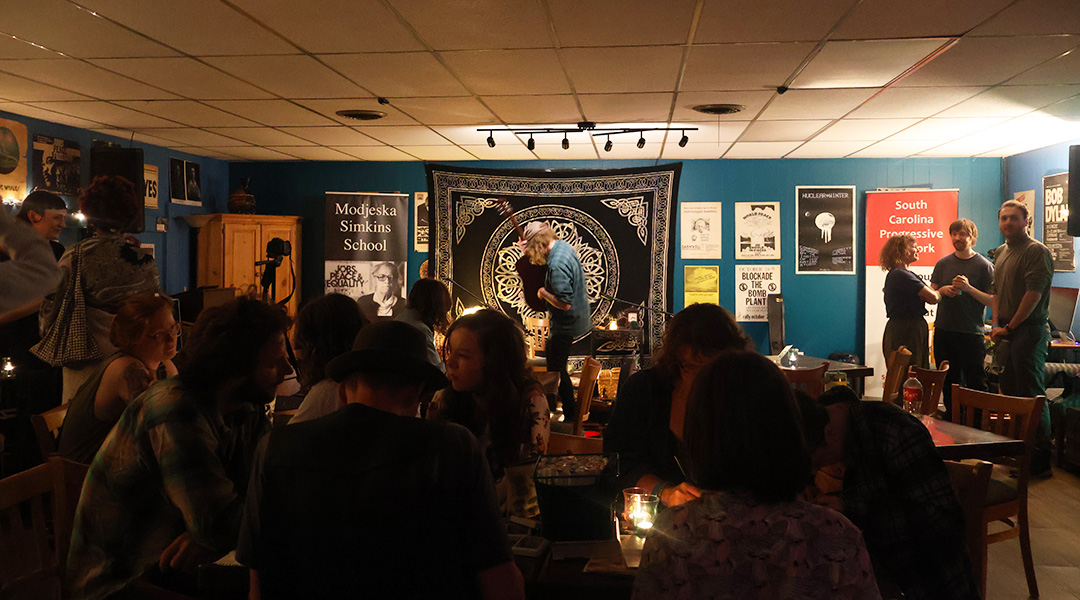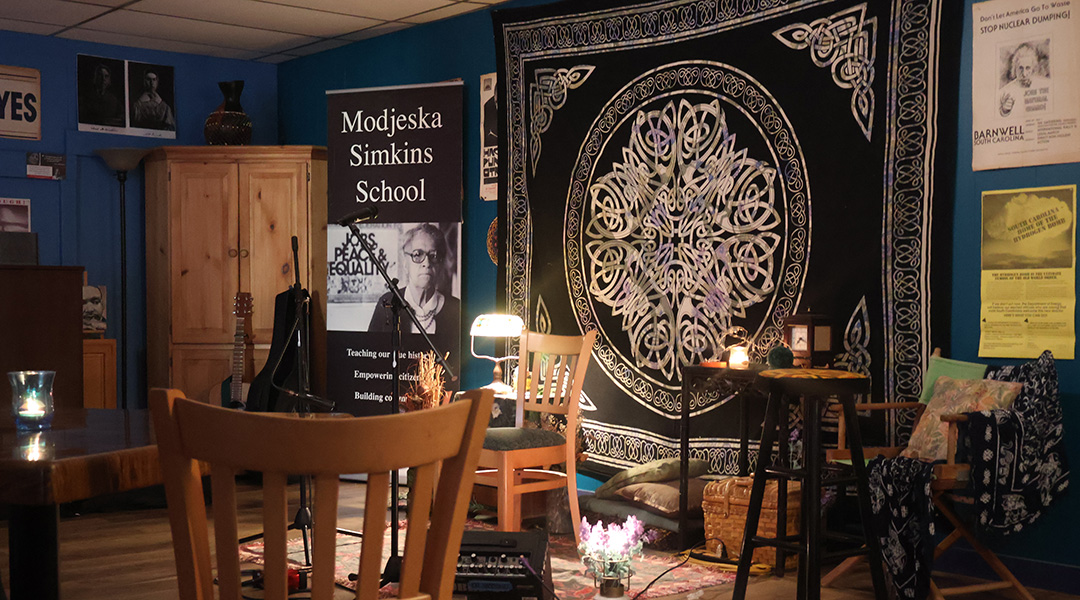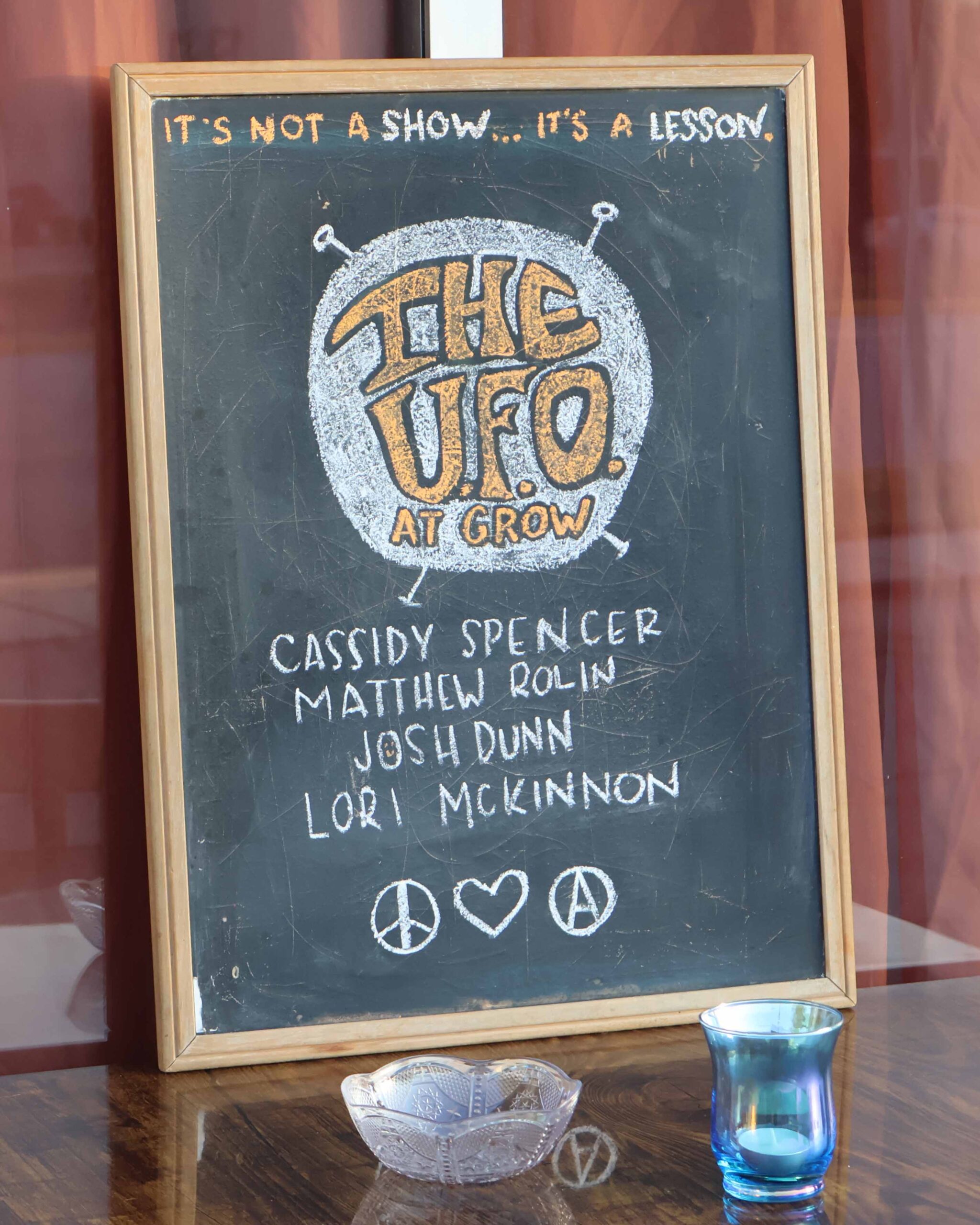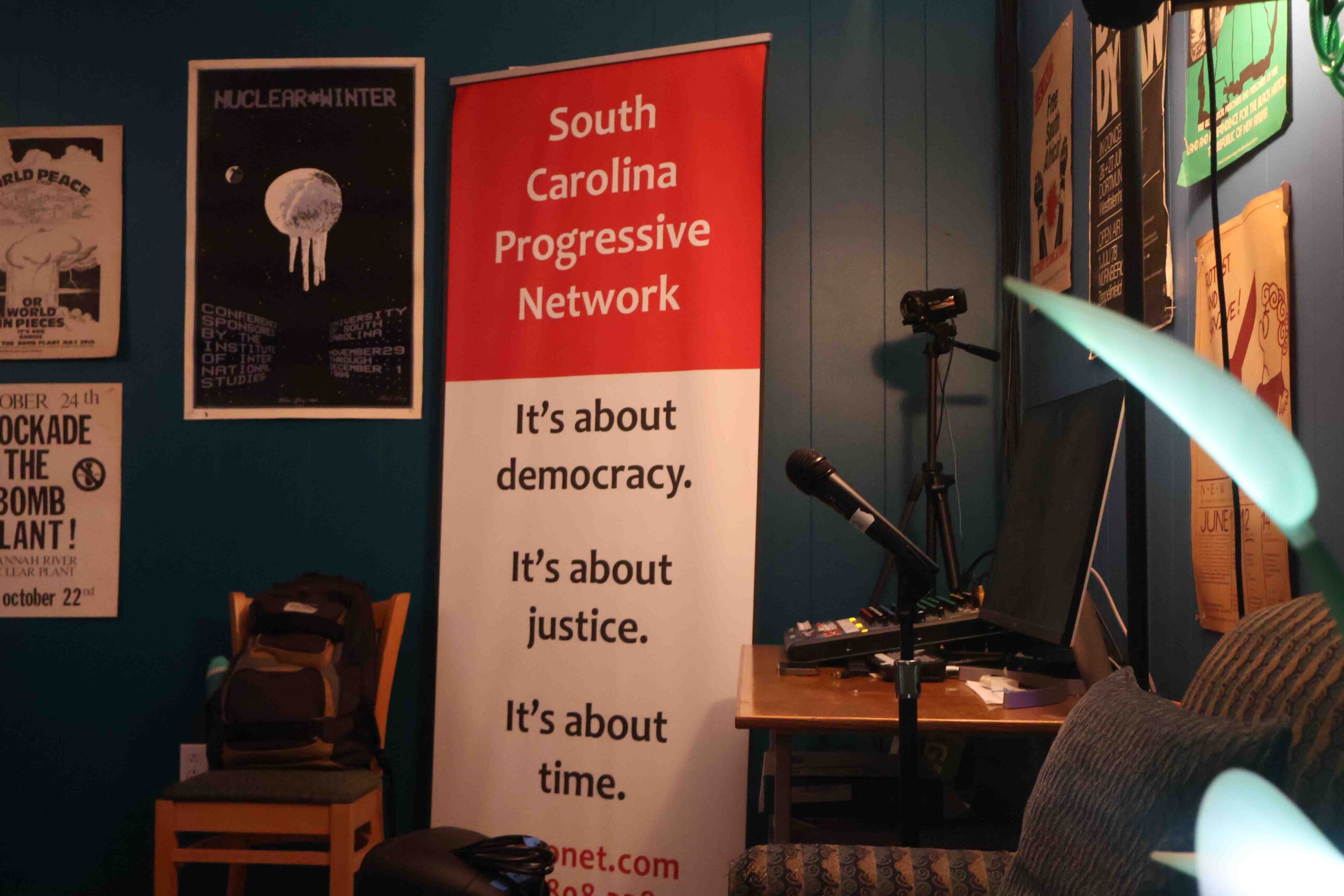Community members wait in anticipation as Josh Dunn prepares for his set in the new music series, UFO at GROW. (Photos by Amanda Petty/Carolina News and Reporter)
Posters emblazoned with “blockade the bomb plant” and other political slogans adorn the dimly-lit walls in the Elmwood Avenue building.
The aroma of coffee and tea linger in the air.
Tucked in the back sits a table with leaflets that detail a highly specific part of South Carolina’s history.
Guests sit in groups and discuss old memories while making new ones. And all eyes are turned in anticipation toward a single empty chair with one microphone angled downwards.
When Kathleen Hammond entered the GROW for the first time for the April 14 show, she was immediately struck by the small building’s atmosphere.
“It’s very intimate, very intentional,” Hammond said. “I like the vibe too, it smells like coffee. It’s very intimate and you can tell, it’s a different feel from any other place you walk into whenever you’re seeing a show.
Hammond witnessed the beginning of a new monthly music series, the UFO at the GROW, a celebration of community and a remembrance of Columbia’s UFO Coffeehouse, the first of its kind in the country.
In the 1960s and ’70s, GI coffeehouses were havens where dissatisfied soldiers could blow off steam and express their anti-war beliefs, away from the prying eyes of the top brass. These places were instrumental in organizing against the Vietnam War.
The first UFO opened in January of 1968 at 1732 Main St., across from Columbia City Hall. The founder, Fred Gardner, was an army reservist who had been stationed at Columbia’s Fort Jackson, according to Becci Robbins, the communications director for the SC Progressive Network.
“It was just right there in the heart (of) Columbia,” she said. “And it was a few blocks from the bus depot where the recruits would come out for a night on the town. So, and it was so successful after six months that Fred left and would open up two more coffee houses in Washington (state) and then Texas, also next to army bases.”
Robbins said this model was replicated all across the country and overseas, but Columbia’s UFO, a tongue-in-cheek name derived from the pro-military USO down the street, was padlocked after two years.
“The cops were just hell-bent on destroying this place, and they finally succeeded,” Robbins said. “They kept sending people in undercover to catch them doing drug deals — they never found any drugs — but they browsed the nearby businesses. It was just a really awful thing.”
On the morning of Jan. 13, 1970, cops arrested four UFO employees and charged them with “operating a public nuisance.” During the trial, the staff were found guilty and were sentenced to six years in jail and the UFO was fined 10,000 dollars.
While that marked the end of the original UFO, it didn’t mean the end of grassroots organizing in South Carolina. GROW, or Grass Roots Organizing Workshop, was founded in 1977 by Brett Bursey, now executive director of the SC Progressive Network.
Now, after a stint in Olympia in the 1970s and ’80s, the nonprofit is located at 1340 Elmwood Ave. and is home to SC Progressive Network and the Modjeska Simkins School.
“GROW was really vibrant, but that vibrancy was the same vibrancy that had at the UFO,” Bursey said. “It was that space where you’re with people that are your people because you have common values.”
GROW was originally located down behind the ballpark in Olympia for 21 years. It was a two-story cinderblock building that was self-sustaining. The enclave operated its own cafe and bar. There was a stage for local bands and an eco-friendly print shop. For a while, there was a large green Hulk painted on the building’s side.
“It’s really, really, really, really, really critical that we create a welcoming place and a fun place for people that aren’t geriatric and on Medicare,” Bursey said. “… Because we want the space to be used intentionally. It’s not a rental hall.”
The organization hosts events, discussions and classes to help people learn about the struggles and the counterculture history that aren’t taught in public schools about the people who fought to make South Carolina a safer place and against the people who have tried to make the state less democratic, according to Josh Dunn, the event organizer and one of the performers.
“It’s a people’s history of South Carolina,” Dunn said. “Starting from pre-colonial South Carolina to today, understanding the struggles that got us to here.”
Dunn said fun events of community and music connect people to the real work that needs to be done right now. The UFO had live music all the time, and he wanted to continue that tradition.
“A big part of that, for me is recognizing that, that moment in the ’70s of that, you know, fight against imperialism,” Dunn said. “It’s so necessary now as we’re, you know, watching our tax dollars go towards genocide and we’re, you know, … more and more beating of the war hammer.”
Both Dunn and Robbins said to know about this history is “empowering,” even though most people don’t know about the UFO or GROW.
“It’s hidden because were we to know it, it would be, it would make our jobs a little bit easier,” Dunn said. “And it’s (an) uncomfortable history. And it’s a history that doesn’t paint the city or the state in the best light and sheds actually a lot of light on who we are.”
Robbins said it’s fun and exciting to witness new blood and new energy infusing the space.
“It really is the most intergenerational thing,” Robbins said. “I mean, we have everything from babies to 92 year olds, literally in the same room, enjoying the same music and it’s, so people come in, and it’s always different.”
And, Bursey, who hung out at the original UFO back on Main Street, sees the UFO’s spirit alive at the GROW. He said the site will continue to host the music series to foster that community.
“We’re not going to lecture people, or we do – we can and we will – but you also have to have fun,” Bursey said. “Emma Goldman was a great revolutionary lady in the early 1890s and throughout the country, and one of the things she was real famous for saying was, ‘If I can’t dance, I don’t want to be in your revolution.’”
The informal stage where performers sat and played acoustic guitars in front of a quiet, attentive crowd
The lineup of performers at the UFO at GROW is the first in a new monthly concert series with an interesting history.
The walls at GROW hold many posters with slogans that show the grassroots organizing work the collective has done over the years.





